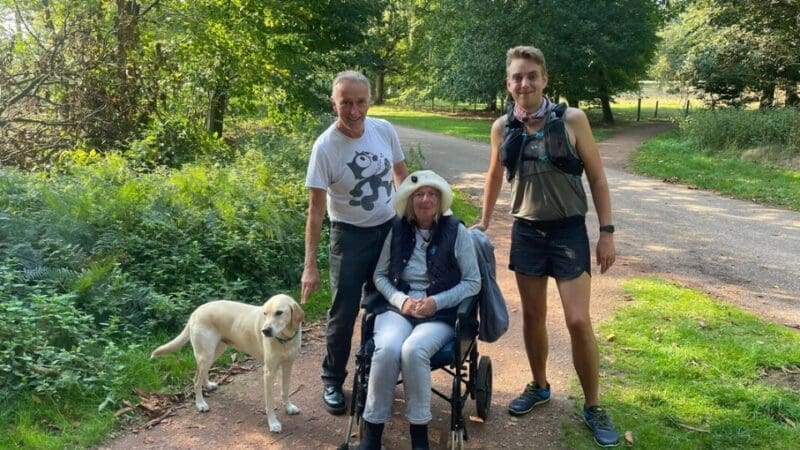Our dementia specialist Admiral Nurses explain the signs and symptoms of sundowning and provide tips for managing it.
Why does sundowning happen?
There are many possible reasons why sundowning may occur. These include:
- tiredness
- the person having unmet needs that they cannot express, eg hunger or thirst
- being in physical pain
- a lack of activity or exposure to natural light during the day
- overstimulation during the day, such as being in a noisy, busy environment
- hormonal changes towards the end of the day
- medication side effects
- changes in the person’s body clock that occur in some types of dementia, such as Lewy body dementia
- environmental changes like streetlights coming on or people settling in for the evening, which can trigger a sense of being in the wrong place
- the person’s family members being tired and less able to meet their needs
- fewer care staff being on shift in a care home to support the person
What are the signs and symptoms of sundowning?
Confusion
Sundowning often makes a person with dementia feel very strongly that they are in the wrong place. They might say they need to go home, even if they are at home, or think they need to pick their children up from school, even if they are now adults. They might believe they have to go to work, even if they are retired.
The person might become confused about who people are or what is going on around them. They might ask the same questions repeatedly, for example, “When will you take me home?”
Anxiety
The sense of intense confusion that comes with sundowning typically makes the person with dementia feel very unsettled and anxious.
Agitation
A person who is sundowning might show agitated behaviour such as restlessness, fidgeting (for example plucking at their clothes or skin), irritability, shouting or arguing. They might follow a family member, pace or walk around – this might seem aimless, but they may be trying to fulfil a need like finding someone they remember or getting something to eat. They might put their shoes and coat on and try to leave their home.
When does sundowning happen?
Sundowning typically happens in the late afternoon and evening, around dusk. It may be brief or last several hours. While symptoms often ease by the time the person with dementia goes to bed, in some people, they may continue into the night.
How common is sundowning?
Sundowning is thought to affect around 20% of people with dementia, and around 80% of people with dementia in residential settings like care homes, particularly if they have recently moved into the home or changed rooms, or if the environment is busy in the evenings. It is most common in the middle to late stages of dementia.
Does everyone with dementia experience sundowning?
Not everyone with dementia will experience sundowning. It depends on the person, their type of dementia and its stage. A person who is affected by sundowning will not necessarily experience it every night.
Tips for managing sundowning
- Try to work out whether there is a pattern to the person’s sundowning. It may be helpful to keep a brief record of what happens beforehand to establish possible triggers
- Try to distract the person: go into a different room, make them a drink or snack, play some music or watch a film
- Displaying a dementia clock that shows the day, date, time and time of day (eg morning, afternoon, evening, night) may be helpful
- Hold the person’s hand or sit close to them and stroke their arm
- If there are children in the person’s home, explain the need for keeping evenings quiet and calm – for example, they could wear headphones for listening to music or playing computer games to minimise noise
Communicating with a person who is experiencing sundowning
- Talk in a slow, soothing way
- Speak in short sentences and give simple instructions to avoid confusing the person
- Ask the person what the matter is. Listen carefully to their response and if possible, see if you can resolve the reason for their distress
- Gently remind them what day and time it is
- If the person struggles to communicate, look for clues in their behaviour – for example, holding or rubbing a part of their body could suggest they are in pain
- Avoid contradicting or arguing with the person as this may increase their distress
Exercise and physical activity
Regular exercise and physical activity can help improve sleep at night and in turn reduce daytime fatigue and evening restlessness, which often make sundowning worsen.
- Follow a daytime routine that contains activities that the person enjoys, like gardening or going for a walk. Staying active during the day, whether through exercise, hobbies or spending time with others, can help to regulate the body clock
- Spending time outside in natural light can help to regulate the body clock. If that is not possible, you could position the person’s favourite chair by a window so they spend time in daylight
- If the person is less mobile, support them to move around in ways that suit their capabilities, such as a gentle walk around the garden or seated exercise
Medication
In most cases, medication is not prescribed for sundowning itself, as it is best managed using the advice on this page. However, in some cases, a person with dementia might be prescribed medication for specific symptoms such as anxiety, agitation or restlessness, which might also help with sundowning.
How we can support you
Dementia UK can support you if you are concerned about sundowning or any other aspect of dementia.
‘Dementia: what next?’: free online sessions for people with dementia, families and friends, hosted by dementia specialist Admiral Nurses.
Admiral Nurse Dementia Helpline: call free on 0800 888 6678 (Monday-Friday 9am-9pm, Saturday and Sunday 9am-5pm, every day except 25th December) or email helpline@dementiauk.org.
Virtual clinic appointments: book a free phone or video call with an Admiral Nurse at a time to suit you.



